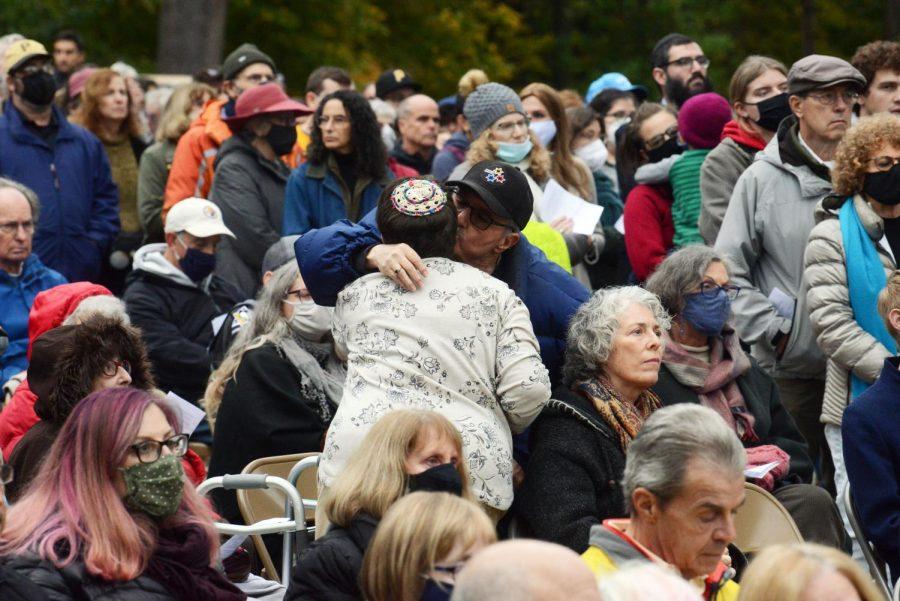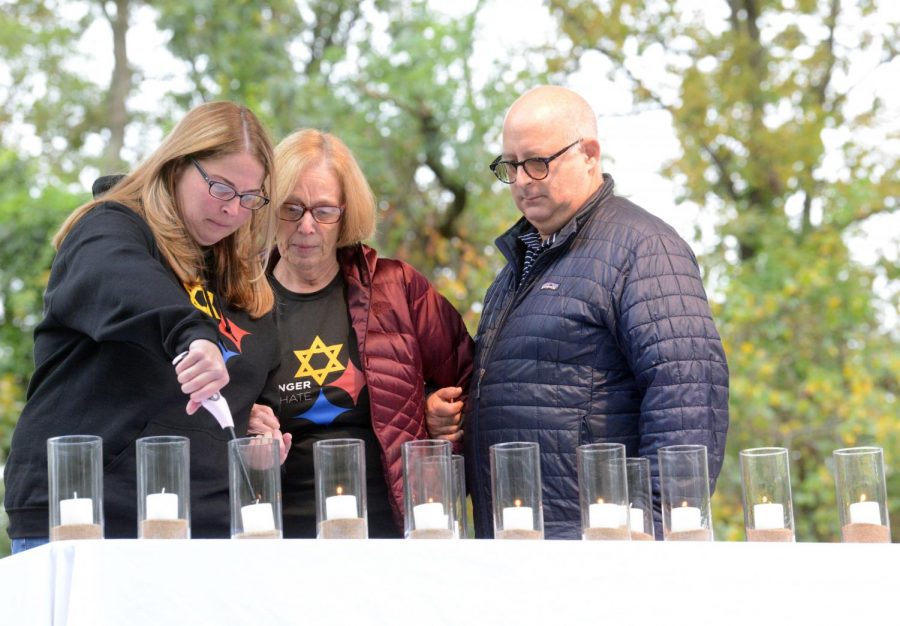‘Steel ourselves’: Community commemorates 2018 Tree of Life massacre
Clare Sheedy | Assistant Visual Editor
Community members embrace at a Wednesday ceremony in Schenley Park to commemorate three years after the Tree of Life massacre.
October 28, 2021
The emotion-laden voice of Rabbi Hazzan Jeffrey Myers from the Tree of Life*Or L’Simcha congregation rang out Wednesday evening, chanting the Jewish mourning prayer El Malei Rahamim for the 11 Jewish worshippers killed three years ago in the Tree of Life massacre.
Wednesday marked three years since the antisemitic attack on the Tree of Life synagogue in Pittsburgh’s Squirrel Hill neighborhood, an event which has etched itself into the surrounding community’s collective memory. Several hundred community members attended a Wednesday evening commemoration ceremony on Prospect Drive in Schenley Park — organized by the 10.27 Healing Partnership, a local nonprofit — which included families of those lost, survivors of the attack and members of the greater Jewish and Pittsburgh communities.
The massacre took the lives of 11 Jewish worshippers attending Saturday services at the synagogue. The worshippers belonged to the three congregations — Dor Hadash, New Light and Tree of Life*Or L’Simcha — which share the Tree of Life building. It is the deadliest attack ever on the Jewish community in the United States, according to the Anti-Defamation League, a nonprofit that fights antisemitism.
Rabbi Ron Symons, founder and director of the Center for Loving Kindness at the Jewish Community Center of Greater Pittsburgh, said everyone is working to rebuild a community still devastated by the attack.
“We need to redefine the term neighbor, from a geographic term to a moral concept,” Symons said. “This is how we remember, so that we can move forward, so that we can find our way to a better community.”
Symons was one of several interfaith leaders who spoke at the commemoration. Other interfaith leaders in attendance included a Muslim imam and a Lutheran reverend canon. Symons said bringing together people from different faiths helped find the right message to send to the community.
“I was asked to bring together a group of spiritual leaders and in so doing we simply started talking,” Symons said. “What are the messages that we want from this, and for my part, it’s about memory, and how does memory from a Jewish perspective compel us to see the light in every person? So we steel ourselves, cry a little bit, take a deep breath, and we do it.”
Maggie Feinstein, the director of the 10.27 Healing Partnership, opened the event and welcomed family members to the stage to light candles in honor of those lost.
HaZamir: The International Jewish Teen Choir performed “Shalom Aleichem” and invited the crowd to join in for “B’shana Ha-Baha.” The crowd joined in to celebrate the lives of the victims.
Myers said he appreciated the message the choir sent.
“I was pleased that we could have children sing, and sing about a bright future. Because sometimes that’s hard to find on a day like today,” Myers said. “It’s reassuring to know that you’re not alone. That there’s a world of good people that embrace us and it reminds us that there are far more good people out there than bad people. It’s a good thing.”
Myers said after the ceremony that he hopes no one else has to recite prayers for lives lost to antisemitism, and lamented the conditions that allowed an attack like this to happen.
“No rabbi in America should ever have to recite those words,” Myers said. “Shame on America that fostered such an environment, that someone would want to go out to the synagogue and kill Jews and think ‘that’s gonna solve my problems.’”
Pittsburgh Mayor Bill Peduto attended the commemoration and read “A Prayer for Our Country,” with Allegheny County Executive Rich Fitzgerald. Peduto said after the event that the City stood with the victims and their families.
“I think that the important thing is that Pittsburgh recognizes that we center this event around the victims and the victims’ families,” Peduto said.
He said that in the wake of the attack, “the City actually gathered around the Jewish community, and said that an attack against one is an attack against all.”
Each of the three congregations housed in the Tree of Life building invited members to recite psalms and poems, including “The New Colossus” and a poem written by Shana Haus, a member of the Tree of Life*Or L’Simcha congregation.
Another faith leader who spoke at the ceremony was Reverend Canon Natalie Hall, a Lutheran pastor from the Episcopal Diocese of Pittsburgh. She said the attack was evil and everyone must work together to create a peaceful community.
“This should not have happened, all of us are just horrified that this happened and we never want this to happen again,” Hall said.
Community member Laura Berman agreed with the sentiment.
“It’s heartening to see so many people show up. That’s what we all need to do for one another,” Berman said. “Hopefully we won’t have to show up for things like this again, but we show up for each other.”
Brian Schreiber, the president and CEO of the Jewish Community Center of Greater Pittsburgh and an event organizer, talked about the lasting impact of the Tree of Life massacre on the community.
“I think it has cemented. I think healing is a long term process. When you have a day like today you always go back to the first day, which was just so shocking and painful and traumatic,” Schreiber said. “And three years later you have the ability to both mourn and reflect at the same time and I think there’s enough distance to be able to do that.”
Schreiber also said the community chose the ceremony’s Prospect Drive location because of the 11 trees planted by the City as a memorial along the street.
Donna Coufal, a community member and member of the Dor Hadash congregation, said she thought her fellow congregants reciting “The New Colossus” was a wonderful tribute.
“One of our members had suggested reading ‘The New Colossus,’ which I thought was really important,” Coufal said. “The reason that we’re here is because of Dor Hadash’s commitment to helping immigrants and ‘The New Colossus’ is the poem that’s on the Statue of Liberty.”
Coufal said she thought the ceremony struck just the right tone of solemnity and felt that everyone left with a better understanding of the attack, and a new peace.
“I think every year has been very different. I think people walked away with a kind of calmness from this event. First of all, it’s the first time we could gather in person for a long time — some of us are still on Zoom,” Coufal said. “And I think it had the right tone of seriousness. It was brief but it was about remembering and I think it did what it was supposed to do.”









